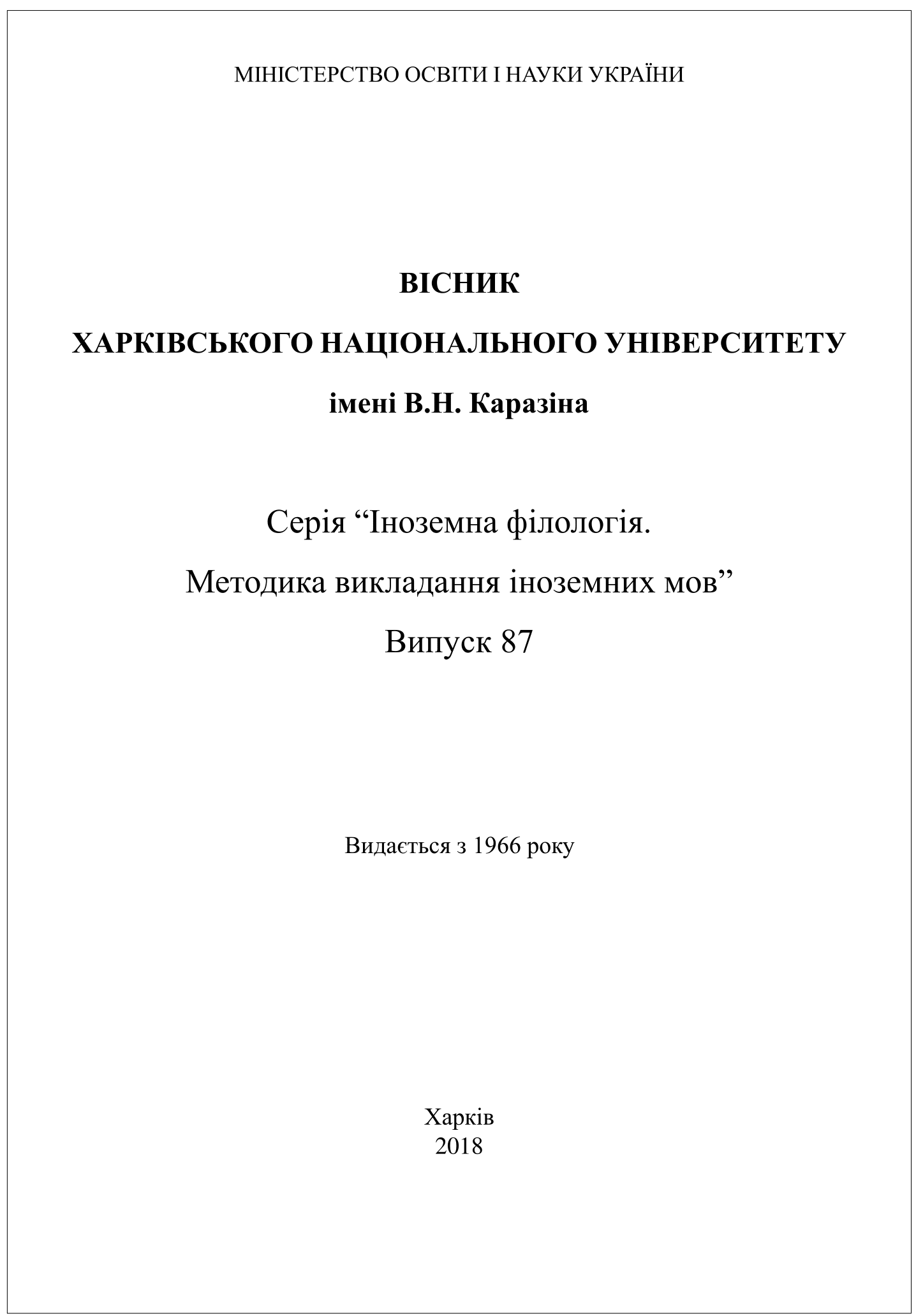Інтеграція французької мови, культури та художніх текстів в аспекті «Домашнє читання»
Анотація
У статті розглядаються актуальні проблеми аспекту «Домашнє читання» на заняттях з французької мови у ВНЗ. Описано форми завдань і вправ, які сприяють залученню студентів молодших і старших курсів до процесу читання іноземної літератури мовою оригіналу; приділяється увага видам екстенсивного опрацювання та аналізу тексту. Інтерпретація іншомовного тексту включає такі етапи: експозицію, аналітико-оціночну, аналітико-лінгвістичну та творчу інтерпретацію. Етап експозиції характеризується зануренням у певну культурно-історичну епоху та створенням емоційно-емотивного тону заняття. Аналітично-оцінний етап відповідає обговоренню проблем у прочитаних автентичних текстах. Аналітично-лінгвістичний етап спрямований на поглиблення мовних навичок на матеріалі класичних творів французьких авторів. Етап творчої інтерпретації націлений на розвиток оціночної сфери студентів, їх творчих здібностей і говоріння; йому відповідають такі типи завдань, як обговорення проблемних питань прочитаного тексту, завдання творчого характеру на формування когнітивних умінь студентів.
Завантаження
Посилання
Artyuhovich, Yu.V. (2014). Obuchenie tsennostyam: aksiologicheskiy pohod k problemam obrazovaniya [Learning Values: Axiological Approach to Education Issues]. Kazanskiy pedagogicheskiy zhurnal. – Kazan Pedagogical Journal, 3, 61–68 (in Russian).
Bim, I.L. (2015). Chto meshaet povyisheniyu rezultativnosti obucheniya inostrannyim yazyikam? [What hinders the effectiveness of teaching foreign languages?]. Inostannyi yazyk v shkole. – Foreign languge at school, 4, 2–6 (in Russian).
Dibrova, O.V. (2009). Aktualni problemy domashnogo chytannya u movnomu vuzi [Actual problems of home reading in the language high school]. Available at: http://www.confcontact.com/ 2009fil/3_dibrova.php
Kovalenko, N.A. and Smirnova, A.Yu. (2015). Domashnee chtenie kak vazhnyiy komponent soderzhaniya obucheniya inostrannyim yazyikam v vuze [Home reading as an important component of teaching foreign languages at a university]. Fundamentalnyie voprosyi teorii i praktiki prepodavaniya. – Fundamental issues of theory and practice of teaching, 1, 91–97 (in Russian).
Mangus, I.Yu. (2001). Strategii ovladeniya yazyikom i razvitiya priemov poznavatelnoy deyatelnosti kak realizatsiya kognitivnogo podhoda v uchebnike russkogo yazyika kak inostrannogo (na primere uchebnikov v estonskoy shkole). Avtoref. diss. dokt. ped. nauk [Strategy of language acquisition and development of methods of cognitive activity as a realization of the cognitive approach in the textbook of Russian as a foreign language (on the example of textbooks in the Estonian school). Dr. ped. sci. diss. synopsis]. Moscow. 45 p. (in Russian).
Minyar-Beloruchev, R.K. (2013). Metodika obucheniya frantsuzskomu yazyiku: ucheb. posobie dlya studentov [Methodology of teaching French: study guide for students]. Moscow: Prosveschenie Publ.
O’Malley, M., and Chamot, A.U. (1994). Language Learner and Learning Strategies. In: M.G. Ellis (ed.). Implicit and Explicit Learning of Languages. London: Academic Press, pp. 43–51.
Passov, E.I., Kibireva, L.V., and Kollarova, Je. (2014). Kontseptsiya kommunikativnogo inoyazyichnogo obrazovaniya (teoriya i ee realizatsiya) [The Concept of communicative foreign language education (theory and its implementation)]. St. Petersbourgh: Zlatoust Publ.
Pryhodko, H.I. (2005). Kohnityvno-pragmatychniy analiz argumentatyvnogo tekstu [Cognitive-pragmatic analysis of the argumentative text]. Tezy` dopovidej mizhnarodnogo forumu «Movna osvita: shlyakh do yevrointegraciyi» [Proc. of international symp.”Language focused education: the way to eurointegration”]. Kyiv, 141–142.
Schukin, A.N. (2014). Obuchenie inostrannyim yazyikam: Teoriya i praktika: uchebnoe posobie dlya prepodavateley i studentov [Teaching foreign languages: Theory and practice: a manual [for teachers and students]. Moscow. Filomatis Publ.
Selivanova, N.A. (2004). Domashnee chtenie – vazhnyiy komponent soderzhaniya obucheniya inostrannyim yazyikam v sredney shkole [Home reading is an important component of teaching foreign languages in high school]. Inostrannyj jazyk v shkole. – Foreign language at school, 4, 21–26 (in Russian).
Zharinova, L.L. (2016). Domashnee chtenie kak odin iz aspektov yazyikovoy podgotovki studentov [Home reading as one of the aspects of language training for students]. Nauka YuUrGU: materialyi 66-y nauchnoy konferentsii. Sektsiya sotsialno-gumanitarnyie nauki [Science in SUSU. Proc. 66th scientific conference. Social sciences and Humanities]. Chelyabinsk, 1171–1179.




